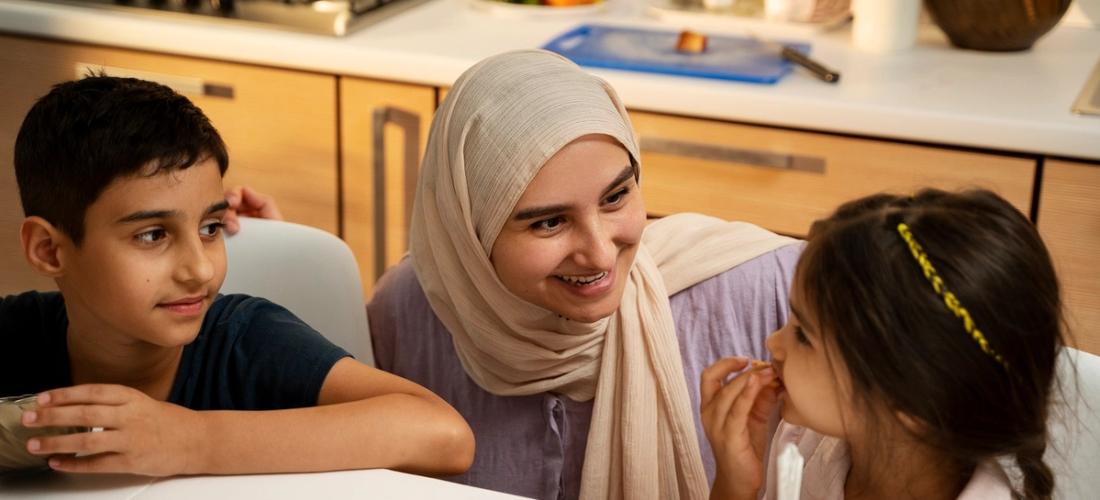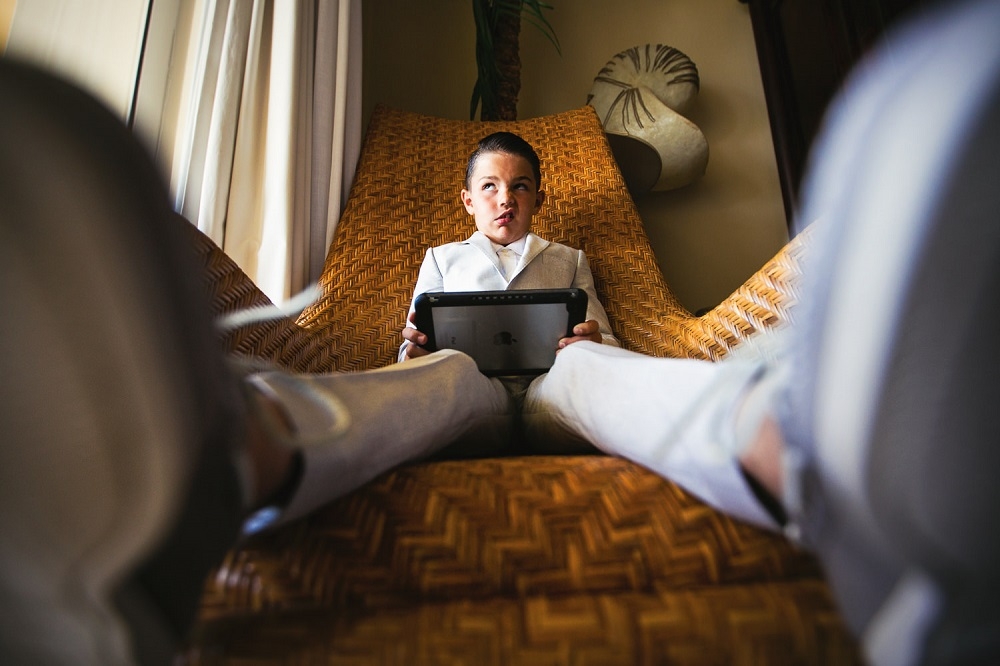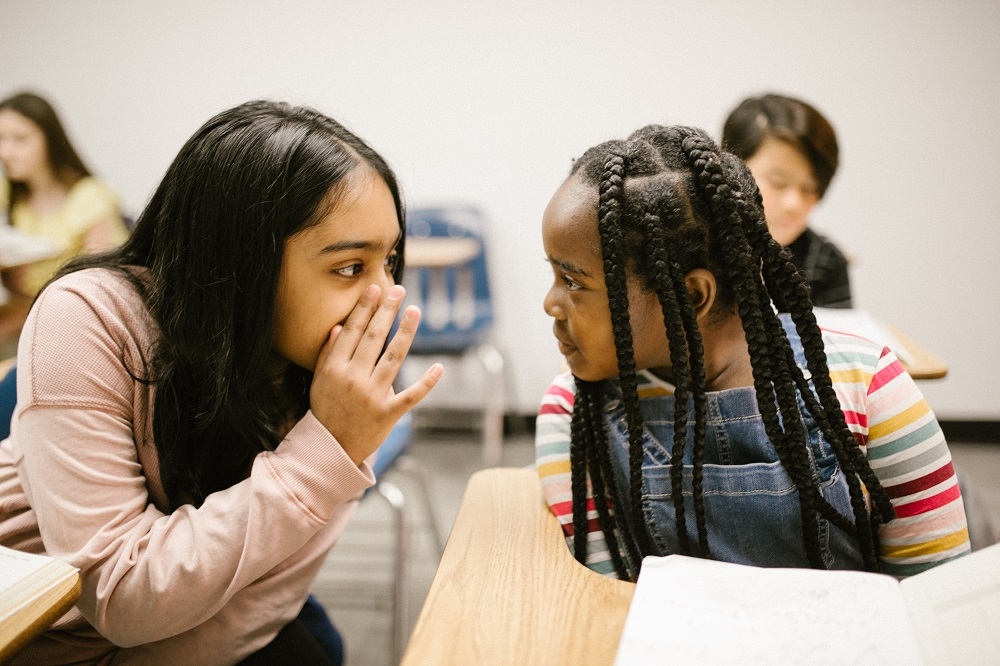Navigating Difficult Conversations with Children: A Positive Parenting Approach
Lifestyle
|
Oct 25, 2023
|
6 MIN READ

Image source: Pexels
By Zaiba Hasan and Dr. Uzma Jafri
On my way home in the carpool recently, my (Zaiba’s) 10-year-old asked, "Why is everyone against the Palestinians?" His question caught me off guard. Despite my efforts to shield him from complex topics, I realized I couldn't control every piece of information he encountered from the outside world.
As an American Muslim parent, I've faced the intricate task of balancing cultural, religious, and national identities while guiding my child through the myriad of conversations today's world presents. So how do we do it? We advocate for a positive parenting approach that empowers us to lead our children through these challenging subjects, ensuring they have a safe space to ask questions and understand the nuances of the world around them. And then, we tailor this approach to each age group.
A friend on our podcast recently posted a drawing her elementary school-aged daughter drew of a child in front of a fire; it was an apparent depiction of destruction and grief despite the simplicity of the drawing. She didn’t understand why asking someone not to kill kids was hard. Unfortunately, this results from inappropriate global language about situations related to Muslims, oversimplifying and, as we’ve seen, doctoring truth to appeal to the masses who cannot access the same information as the rest of us.
My (Uzma’s) teenage son echoed Zaiba’s son’s words because, again, the illegal occupation of indigenous Palestine by settler colonialism has been boiled down to that for our children by mainstream media.
At all ages, we can model and demonstrate our values. More importantly, we must teach our children the language of those Islamic values and foster global responsibility as Allah (S) intended for us.
Toddlers (1-3 years)
Focus on security: Establish a loving and secure environment at home, even when the outside world feels overwhelming. This is when those neurons make essential connections, and as the ones charged with their safety and education, we can teach kids the names of things. That’s the first thing Allah (S) did for Adam (as). And if it’s important enough to mention in the Quran, we should follow suit.

So maybe “genocide” and “ethnic cleansing” aren’t necessary to talk about at this stage, but it’s not too early to help the kids identify our THREE holiest masjid and the history of our Qibla. It’s not too early AT ALL to teach the kids to seek comfort in Allah (S) by making du’a, and to emphasize that all du’a are accepted by Allah (S) (but maybe not exactly how you made that du’a). I tell my kids that Allah (S) grants the du’a of children faster because they are better than grown ups, who have more sins. It’s empowering and, hopefully, a lesson they remember when they’re older. So far, so good.
Limit news intake: Shield your little ones from adult conversations and offer them play and learning without unnecessary exposure to the world's chaos. Our podcast has addressed the problem with mainstream news media, so it doesn’t help kids to listen to that anyway. Besides, media reports often present images to kids they may not be able to process at this stage.
Affirm their feelings: Validate your child's worries or insecurities. Let them know it's normal to feel how they feel and reassure them of your presence and protection. If we learn not to minimize their problems early on, they’ll trust us with their worries later, and that trust takes years to build and moments to break.
Preschoolers (4-5 years)
Be their guide: When your preschooler asks questions, it shows trust. Respond with age-appropriate answers to nurture their understanding. A lot of our kids are exposed at this point to different communities (we hope they are!), and they will pick up words and topics we may not be ready for them to hear.

Image source: Pexels
Social media and its draw for the tiniest kids is not to be taken for granted. Make sure what they’re watching online is appropriate. Also, it’s easy to know who their friends are at this point. You can hear what’s up and address it yourself.
Embrace their curiosity: Provide simple explanations to their inquiries. Teach them about love and kindness, emphasizing that these values prevail despite disagreements. If more politicized words have made it into their vocabulary, “We can talk about this when you’re bigger” won’t cut the mustard. We hated hearing that when we were this age, remember? And it directly undermined our sense of security: Can I not be trusted with this information? Is there something scary mom doesn’t want me to see? Provide simple explanations.
Empower them with knowledge: Introduce your child to different cultures and values to promote understanding and compassion. But at this point, we can provide simplified definitions of bigger, scarier words with assurances that, as Muslims, we can solve anything with the mercy and blessings of Allah (S).
Setting a foundation for a unified community, one humanity can quickly be done by reminding our kids that Allah (S) sent the Quran for the world, not just for Muslims. Playdates and volunteering with children of other faiths are a great way to kick off this sense of global responsibility and love.
Early Elementary (6-8 years)
Nurture empathy: Inspire empathy by sharing stories worldwide that highlight unity, friendship and hope. We often find our peers minimizing the contributions of other faiths, but of course we will disagree. To foster that sense of one humanity, one creation of Allah (S), now is the time to point out that we can all work together to nurture the world He gave us to steward. We all have a part to play.
Keep it simple: Break down difficult topics into bite-sized information. Teach them that most individuals strive to make a positive difference when conflicts exist. How you do this will be relative to the situation your child brings up, but asking more questions rather than stating our often emotional reactions to world news is a good idea. Examples include, “Why do YOU think someone would think this is okay?” or “What could all of us have done better in this situation?” My favorite is, “What would Allah (S) say about that?”

Image source: Pexels
Celebrate the good: Shift the focus onto heroes and positive stories from challenging situations. One can never fail with Sunnah and Sahaba stories of community service, accountability and responsibility.
Late Elementary (9-10 years)
Engage and educate: Engage your child in conversations about more profound issues, such as core values, beliefs, and the importance of unity amidst diversity. As an American Muslim parent, share how your faith promotes peace and separates a few individuals who may mean or want to inflict harm from the majority. At this point, most of our kids have faced bigotry. It’s the unfortunate reality of American Muslims, but we must address it head-on and demonstrate that things can be done about it.
Speaking up, seeking justice, and understanding are the goals. If bigoted language has made it into their vocabulary, advise them to cut it out of their vernacular immediately. If we expect equal treatment and respect, we must offer it to others.
Encourage critical thinking: Foster inquiry by posing open-ended questions, encouraging your child to think critically. Challenge them to consider how they would act in certain situations or how they can contribute positively. The same questions we asked them a stage ago can be more specific now, and the kids are encouraged to consider opportunities to educate their peers, and often, teachers, in a non-confrontational way.
Promote positive media: Guide your child towards uplifting news and stories that instill hope and a sense of global unity. Again, regardless of the faith community contributing to that positive story. Volunteering, especially with interfaith groups for a common community or global goal, is a great way to create our own stories of good work in the face of adversity and helplessness.
Irrespective of age, it's crucial to be their pillar of support. Assure their feelings and questions are valid, and they can always turn to you. In every conversation, provide a beacon of hope through the power of salah, siyam, and du’a.
We pray for global peace, unity, and compassion in our home. Positive parenting cultivates understanding, compassion, and hope in our children. As we navigate this ever-changing world, let us equip our future generations with love, empathy, and resilience.
Subscribe to be the first to know about new product releases, styling ideas and more.
What products are you interested in?



